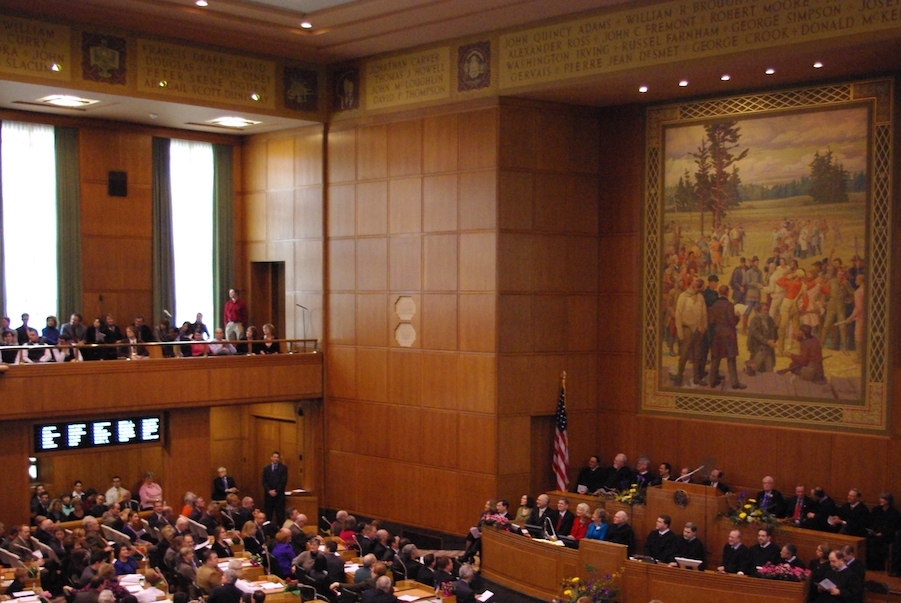Democrats hold all the cards, but they’ll need to play them wisely.
Democrats won a supermajority, or three-fifths control, on Tuesday in both Oregon’s state House and Senate, giving them free reign to pass tax increases. The party also won more bargaining power on top issues for 2019, including the Public Employees’ Retirement System (PERS) and cap-and-trade legislation.
But analysts say the party will need to reign in its enthusiasm if it wants to lay the groundwork for long-term solutions. Many of the Democratic winners squeaked through the polls, and the supermajority won’t last forever. If the left governs with too heavy a hand, voters and future Republican legislators will remember.
“We’ve seen blowback in the past,” says Jim Moore, professor of political science at Pacific University. “There needs to be some caution exercised among the jubilant Democrats.”
“The challenge will be not to overreach,” says Len Bergstein, a lobbyist with Northwest Strategies. “I don’t think there’s going to be any wholesale rush pushing new taxing through.”
Last session, Democrats and Republicans split along party lines on tax bills. Democrats narrowly stopped a federal tax deduction, which Democrats argued was essentially a second tax break for so-called pass-through businesses, from being copied into state law. Three house Democrats voted against it. In 2016, as she was running for her first term, Governor Brown supported ballot measure 97, which would have increased the corporate tax rate. Ultimately voters rejected the measure.
As it stands today, Democrats could pass tax increases on businesses without any Republican support. That is, if they can hold the party line. Everyone is on board in the House, Moore says, but in the Senate one particularly ambivalent Democrat holds all the cards.
Senator Betsy Johnson’s (D-Scappoose) hesitation to raise taxes and willingness to buck the party line sets her up to be possibly the most powerful lawmaker in the 2019 session, Moore says. So much so that tax increases have historically been dubbed “the Betsy Johnson issue.”
“It’s going to come down to negotiations between Senate and House leadership, ways and means, the governor’s office and Betsy Johnson,” Moore says. “She’s been there before. She’s also really good at it.”
“It’s going to come down to negotiations between Senate and House leadership, ways and means, the governor’s office and Betsy Johnson,” Moore says.
Businesses that backed ballot measures 103 and 104 to guard against new taxes will now be forced on the defensive, says Bergstein. Measure 103 would have banned new taxes on grocers, including a soda tax. Measure 104 would have required a supermajority to repeal tax breaks. Bergstein says both measures were obscured in confusing language, leading to their defeat. Now their backers are getting the opposite of what they wanted.
“The people who brought these issues forward kind of created their own bed here that everybody’s going to lie on,” Bergstein says. “They defined the field then designed it poorly and effected poor campaigns.”
 Oregon State Capitol (Photo: M.O. Stevens)
Oregon State Capitol (Photo: M.O. Stevens)
Taxation is the issue that comes up the most when there is a supermajority, but a Salem chock full of Democrats will also make things breezy for cap and trade. Democrats could pass the proposal, likely to be the biggest issue of the 2019 session, with no Republican support.
“I think the stars are aligned,” Bergstein says. “The business community needs to come to the table with what they want in return for making this an effective policy passage.”
“It’s going to be a hard discussion to get Republicans on board,” Moore says, “but 20 or 30 years ago it wouldn’t have been.”
The business community remains divided on the issue. Oregon Business and Industry did not immediately respond to requests for comment on this article, but the lobbying group has strongly opposed a cap-and-trade bill in the past. Another group, the Oregon Business Alliance for Climate, chaired by Tom Kelly, the CEO of general contractor Neil Kelly, advocates for the carbon pricing plan.
As with the tax issues, analysts say pushing the bill through with no Republican support would be a bad idea. Passing the bill is only the first small step. Implementing the incredibly complex policy will require years of bipartisan discussions.
Moore says businesses can see cap and trade as an opportunity to reduce emissions through market forces rather than outright regulation. During the Reagan era, he noted, cap and trade was the Republican business solution to climate issues. Democrats wanted more regulation. Then, in the early 2000s, the party began to abandon environmental issues, and Democrats took up the mantle of carbon pricing.
“It’s going to be a hard discussion to get Republicans on board,” Moore says, “but 20 or 30 years ago it wouldn’t have been.”
While cap and trade will likely move forward in 2019, Moore expects only incremental steps toward solving the $22 billion in unfunded liabilities at PERS, the state pension plan for public employees. House Democrats, he says, will not be likely to change much to avoid angering unions. The Senate is in a better position to make changes, but a solution lies at least two to five sessions in the future.
Despite the terrifying rhetoric, Moore says, Oregon actually stands in better position with its retirement system compared with other states. Lawmakers, he says, should not see PERS as the only solution for solving the state budget deficit. “PERS has become the whipping boy for the structural deficit,” he says. “The bigger issue is healthcare costs.”
The most important political chess piece, Moore noted, is still the governor. With a supermajority in both chambers, Bergstein says, Brown can take an ambitious stance on her priority issues: housing, healthcare and education.
In a written statement provided by his spokesperson, president of the Portland Business Alliance Andrew Hoan said that businesses remain committed to working with Governor Brown and the supermajority of Democrats. “Regardless of what party holds power in Salem,” he wrote, “we all agree that stable family-wage jobs, access to quality educational opportunities and affordable homes for those who need them the most are top priorities.”
To subscribe to Oregon Business, click here.





